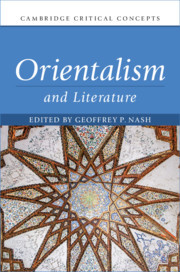Description
Orientalism and Literature
Cambridge Critical Concepts Series
Coordinator: Nash Geoffrey P.
Discusses how Orientalism, a key critical concept in literary studies, has evolved and assists our reading of literature.
Language: English
Publication date: 11-2019
388 p. · 16x23.5 cm · Hardback
388 p. · 16x23.5 cm · Hardback
Description
/li>Contents
/li>Biography
/li>
Orientalism and Literature discusses a key critical concept in literary studies and how it assists our reading of literature. It reviews the concept's evolution: how it has been explored, imagined and narrated in literature. Part I considers Orientalism's origins and its geographical and multidisciplinary scope, then considers the major genres and trends Orientalism inspired in the literary-critical field such as the eighteenth-century Oriental tale, reading the Bible, and Victorian Oriental fiction. Part II recaptures specific aspects of Edward Said's Orientalism: the multidisciplinary contexts and scholarly discussions it has inspired (such as colonial discourse, race, resistance, feminism and travel writing). Part III deliberates upon recent and possible future applications of Orientalism, probing its currency and effectiveness in the twenty-first century, the role it has played and continues to play in the operation of power, and how in new forms, neo-Orientalism and Islamophobia, it feeds into various genres, from migrant writing to journalism.
Introduction Geoffrey P. Nash; Part I. Origins: 1. Styles of Orientalism in the eighteenth century Suvir Kaul; 2. The origin and development of the Oriental tale James Watt; 3. Romantic Orientalism and Occidentalism Saree Makdisi; 4. The Victorians: empire and the East Sukanya Banerjee; 5. Orientalism and Victorian fiction Daniel Bivona; 6. Orientalism and race: Aryans and Semites Christopher Hutton; 7. Orientalism and the Bible Ivan D. Kalmar; Part II. Development: 8. Said, Bhabha and the colonized subject Eleanor Byrne; 9. The Harem: gendering Orientalism Reina Lewis; 10. Orientalism and Middle East travel writing Ali Behdad; 11. Nineteenth and twentieth American Orientalism David Weir; 12. Edward Said and resistance in colonial and postcolonial literatures Valerie Kennedy; 13. Can the cosmopolitan writer be absolved of racism? Andrew C. Long; Part III. Application: 14. From Orientalism to Islamophobia Mahmut Mutman; 15. Applications of neo-Orientalism and Islamophobia in recent writing Peter Morey; 16. Orientalism and cultural translation: Middle-Eastern American writing Carol W. N. Fadda; 17. New Orientalism and the American media: New York Cleopatra and Saudi 'giggly black ghosts' Moneera Ghadeer; 18. On Orientalism's future(s) Anouar Majid; 19. The engine of survival: a future for Orientalism Patrick Williams.
Geoffrey P. Nash is a Research Associate at the School of African and Oriental Studies, University of London. He is the author/editor of: Marmaduke Pickthall: Islam and the Modern World (2016); Postcolonialism and Islam: Theory, Literature, Culture and Film (2014); Writing Muslim Identity (2012); Comte de Gobineau and Orientalism: Selected Eastern Writings (2008).
© 2024 LAVOISIER S.A.S.





